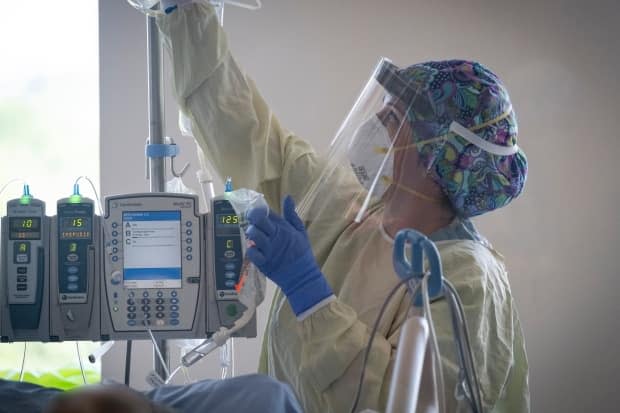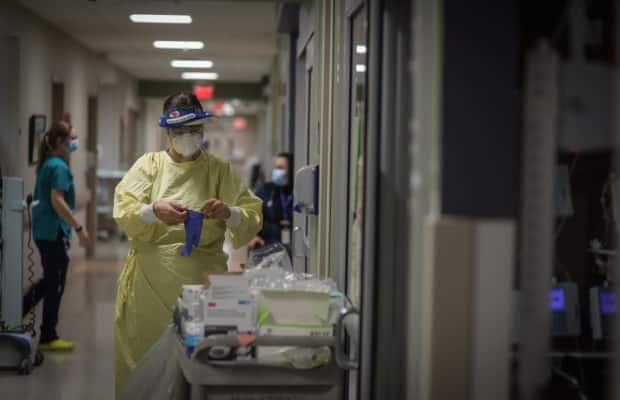Federal support needed but won't solve Alberta's COVID-19 crisis quickly, doctors say

As Alberta talks with Ottawa about potential pandemic aid, some doctors worry the province's COVID-19 situation could get worse before any federal help arrives.
The province has asked for help airlifting patients out of Alberta and to be lent critical care staff, particularly registered nurses and respiratory therapists.
But those transfers and training out-of-province staff pose logistical challenges, according to three Edmonton physicians. In interviews with CBC News, they said resources from other provinces could help reduce the strain on Alberta's intensive care units, but not immediately.
Federal help "may take a little bit of pressure off the system," said Dr. James Talbot, a former chief medical officer of health and current co-chair of Alberta's Strategic COVID-19 Pandemic Committee, "but it's not enough to prevent a disaster."
Talbot said the provincial government should have asked for help sooner because Alberta "is in a crisis close to meltdown."
The province last week introduced a proof-of-vaccination program, declared a health emergency and introduced other public health measures amid a surge in cases.

As of Wednesday, there were 1,040 patients in Alberta hospitals with COVID-19, including 230 in intensive care beds. Both numbers are the highest the province has seen.
Dr. Shazma Mithani, an ER physician in Edmonton, told CBC News the province should bring in stronger health measures.
Mithani pointed out that, unlike in other provinces, Alberta's vaccine passport program is not mandatory. It allows businesses and venues to operate without health measures if they require proof of vaccination or a negative test result, but businesses can choose not to participate in the program and operate with restrictions.
"We really need to focus on stopping the spread of COVID-19 very rapidly so that we don't progress further to the point where we need military hospitals or we need field hospitals, and we need this additional help from the rest of the country," Mithani said.
Dr. Neeja Bakshi, an internal medicine physician who works in the COVID-19 unit at Edmonton's Royal Alexandra Hospital, said she expects additional staff will be needed within the next week.
The triage protocol, a critical care framework that prioritizes patients most likely to survive, can be triggered if Alberta's health-care system becomes overwhelmed. The threshold for implementing the protocol is when the province is using 90 per cent or more of its critical-care surge beds.
According to Alberta Health Services (AHS) on Wednesday morning, ICU capacity, including surge beds, was at 87 per cent.
In the North and Central zones, ICU capacity, including surge beds, was either at or above 100 per cent.
AHS is exploring having registered nurses and registered therapists with critical care experience and skills travel to Alberta to work in ICUs, spokesperson Kerry Williamson said.
He said that if Alberta can't meet demand, COVID or non-COVID patients could be sent out of province to receive treatment, after being "carefully assessed" and deemed suitable for transfer.
Bakshi said visiting health-care professionals need time for training and orientation so they can learn computer programs and understand how Alberta hospitals are set up.
"It's not quite as simple as saying, 'Let's bring a nurse and we'll be ready to go tomorrow,'" she said.
"Health-care providers are fairly resilient and so I think they'll be able to pick up as much as they can and try and help as much as they can, but I don't think it's something that can instantly change capacity overnight."
Requests for federal assistance are co-ordinated by Public Safety Canada's Government Operations Centre.
A spokesperson for Public Safety Canada said along with Health Canada, the Public Health Agency of Canada, the Canadian Armed Forces and other federal departments, it is working with Alberta's provincial government to determine what resources are needed and how the federal government can help.'


 Yahoo Finance
Yahoo Finance 